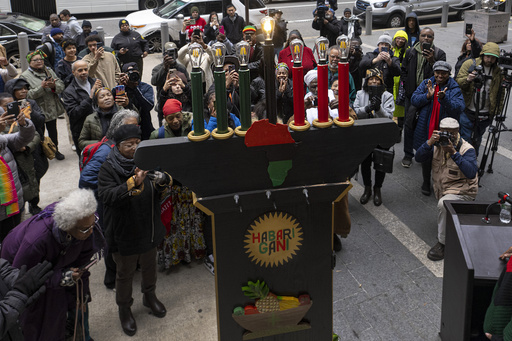Kwanzaa has evolved into a widely acknowledged celebration of African heritage and community throughout the United States since its establishment in 1966, as well as in various nations with significant populations of African descent.
The holiday, which spans from December 26 to January 1, functions as a unifying communal event that emphasizes self-determination and solidarity against oppression. It is observed through large city-sponsored gatherings as well as smaller community events and private family celebrations across the country.
Over the years, Kwanzaa’s popularity has risen, with a 2019 survey indicating that around 3% of Americans participate in the celebration. Past Presidents Bill Clinton, George W. Bush, and Barack Obama have released statements honoring the holiday, and the U.S. Postal Service began issuing Kwanzaa-themed stamps in 1997. However, it is not officially recognized as a federal holiday.
Kwanzaa originated during the Black Freedom Movement of the 1960s as a means of reconnecting African American communities with their vital cultural traditions that were disrupted by the transatlantic slave trade. The holiday is also a celebration of unity and liberation.
“It was also shaped by that defining decade of fierce strivings and struggles for freedom, justice, and associated goods waged by Africans and other peoples of color all over the world in the 1960s,” stated Maulana Karenga, the creator of Kwanzaa, in his annual proclamation in 2023. “Kwanzaa thus came into being, grounded itself and grew as an act of freedom, an instrument of freedom, a celebration of freedom and a practice of freedom.”
Karenga, an author, activist, and educator, introduced Kwanzaa in response to the Watts Riots, also known as the Watts Rebellion, that occurred in Los Angeles in 1965. He has characterized Kwanzaa as a “political-motivator holiday” during an interview for PBS with Henry Lewis Gates Jr.
“The idea is for African and African-descended people to unite around family, community, and culture so we can occupy spaces where, in Dr. Karenga’s words, we feel fully African and fully human at the same time,” explained Janine Bell, president and artistic director of the Elegba Folklore Society in Richmond, Virginia.
Kwanzaa, recognized as a secular holiday, is often celebrated concurrently with religious observances such as Christmas. Individuals of any background, regardless of faith, can partake in the festivities.
The name “Kwanzaa” is derived from the Swahili term “mutanda ya kwanza,” meaning “first fruits” or “first harvest.” The additional “a” was introduced to represent the seven children present during the inaugural Kwanzaa, with each child assigned a letter.
The holiday is built upon seven guiding principles known as the Nguzo Saba, with each principle—Umoja (Unity), Kujichagulia (Self-Determination), Ujima (Collective Work and Responsibility), Ujamaa (Cooperative Economics), Nia (Purpose), Kuumba (Creativity), and Imani (Faith)—celebrated on separate days. These principles are symbolized by a candle holder named kinara that features seven candles. Every night, one of the colored candles, matching the hues of the Kwanzaa flag (black for the people, red for their struggles, and green for their hopes), is lit.
Across the nation, major Kwanzaa festivities are held annually in cities such as Los Angeles, Atlanta, and Detroit, featuring cultural displays of storytelling, music, and dance. This year, the theme at the Capital City Kwanzaa Festival in Richmond focuses on “knowledge of self,” with the opportunity for one African descendant to win a DNA test from a drawing.
The holiday is also commemorated in homes, particularly focusing on children, vital to cultural preservation and community building. The significance of children is often represented through corn, symbolizing the future they encapsulate.
“The goal is that this is a year-round commitment,” Bell remarked. “The need for these principles and the reinforcing value they hold do not dissipate after January 2nd.”
Family gatherings during Kwanzaa typically include gift-giving and sharing traditional African American and Pan-African dishes, culminating in the Karamu feast that features a variety of meals from the African diaspora. Common foods during Kwanzaa celebrations include Southern favorites like sweet potato pie, as well as popular African dishes such as jollof rice.
Activities during the seven days focus on strengthening communal ties, honoring the past, and recommitting to central African cultural values. This may consist of dancing, reciting poetry, paying tribute to ancestors, and lighting the kinara each day.


